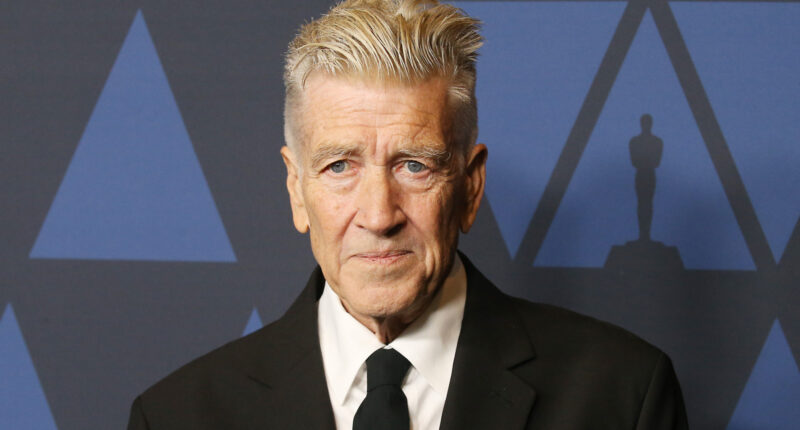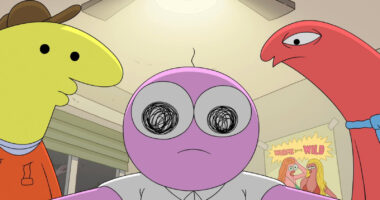Share this @internewscast.com
We may receive a commission on purchases made from links.
When David Lynch passed away on January 16, 2025, he left an extraordinary and unique legacy. Known for his roles as a filmmaker, painter, musician, and actor, Lynch introduced surrealism into the mainstream with films like “Blue Velvet” and “Mulholland Dr.” and the television series “Twin Peaks.” His creations fused small-town Americana with elements of violence and decay, inspired by his time at the Pennsylvania Academy of Fine Arts in Philadelphia. Lynch’s journey into filmmaking began with independently-produced shorts, which led to a fellowship at the newly-formed American Film Institute. There, he directed his first feature film, the midnight movie classic “Eraserhead,” marking the beginning of a storied career.
Lynch’s filmography and television work were eclectic mixes of cinematic styles, drawing inspiration from noir, soap opera, camp, and horror. His plots often unfolded within the realm of dreams and nightmares, featuring mysteries, Hitchcockian blondes, and the perpetual clash between good and evil. With soundtracks filled with 1950s pop hits and scenes that shifted abruptly from comedy to violence, his works epitomized the distinctly “Lynchian” style. Though many tried to emulate him, Lynch’s originality was unparalleled. Here is our ranking of all 12 David Lynch movies and TV shows, from worst to best.
12. Dune
Lynch’s sole venture into blockbuster cinema was the condensed adaptation of Frank Herbert’s sci-fi novel, “Dune” (a project he took on instead of “Return of the Jedi”). The extensive interplanetary saga focused on the battle for the desert planet Arrakis, a narrative so intricate that Denis Villeneuve later split his adaptation into two films. Lynch’s version squeezed the story into just 137 minutes, necessitating substantial edits, voice-over narration, and, to quote Elaine Benes, some “yada yada yada-ing” to remain coherent. Despite its defenders today, the film suffered as a critical and commercial failure upon release, quashing any idea that Lynch might transform into a surrealist Spielberg.
Despite its failure amongst critics and audiences, there are many positives to “Dune” in terms of Lynch’s career. For one, it introduced him to Kyle MacLachlan, who made his acting debut as Paul Atreides, the noble-born son who leads the Arrakian people in their fight against the Harkonnens. For another, it was produced by Dino De Laurentiis, who produced Lynch’s next film, “Blue Velvet.” But most importantly of all, it taught Lynch to stay true to his artistic convictions and chart his own creative path.
Cast: Kyle MacLachlan, Patrick Stewart, Brad Dourif, Virginia Madsen, Sean Young, Sting, Max von Sydow
Runtime: 137 minutes
Year: 1984
Where to watch: Netflix
11. Inland Empire
“Inland Empire” was the last feature film David Lynch completed before his death, and it grew out of a desire to experiment with newfangled DIY filmmaking tools like consumer-grade video cameras and editing software. Rather than start with a completed script, Lynch entered into every shooting day with freshly written pages and saw which way the wind was blowing with his cast and crew. The plot — to the extent that there is one — involves an actress, Nikki Grace (Laura Dern), who loses her grip with reality after getting cast in a new romantic drama. There’s also a subplot involving Polish sex workers, explorations into the nature of duality, and a sitcom starring Justin Theroux, Naomi Watts, and Laura Harring as talking rabbits.
“Inland Empire” isn’t everyone’s cup of tea. It’s for the real Lynch-heads, who will follow the director’s subconscious wherever it takes him. Its three-hour runtime can be punishing for casual viewers, as can its low-grade production value. Yet there’s something unsettling about the digital video aesthetic, which adds an eerie level of reality to the nightmarish imagery. It’s hard to imagine Creepypasta internet videos without Lynch paving the way with “Inland Empire,” perhaps the fullest exploration of his psyche.
Cast: Laura Dern, Jeremy Irons, Justin Theroux, Harry Dean Stanton, Julia Ormond
Runtime: 180 minutes
Year: 2006
Where to watch: Max
10. Wild at Heart
David Lynch was at the height of his powers by the time he made “Wild at Heart,” having directed “Blue Velvet” and “Twin Peaks” back-to-back. As such, he was granted permission to go full Lynch-mode for this violent road movie about on-the-run lovers Sailor Ripley (Nicolas Cage) and Lula Pace Fortune (Laura Dern). Heavily influenced by Southern Gothic, Elvis Presley, and “The Wizard of Oz,” it takes the director’s artistic eccentricities to the extreme, veering wildly from scenes of carnage and carnality to moments of broad comedy and sentimentality. Reactions to Lynch’s work have always been divisive, but never more so than with “Wild at Heart,” which elicited outright boos from audiences when it won the Palme d’Or at the Cannes Film Festival.
In all fairness, “Wild at Heart” can be a tough pill to swallow. Watching Willem Dafoe’s degenerate Bobby Peru accidentally blow his head off with a shotgun is pretty gnarly, and it can feel jarring when juxtaposed against Diane Ladd (who earned an Oscar nomination for her performance as Lula’s mother, Marietta) riding a broomstick as the Wicked Witch. Yet whenever Sailor and Lula are together, Lynch’s sincerity shines through, and the film feels truly wild at heart.
Cast: Nicolas Cage, Laura Dern, Willem Dafoe, Crispin Glover, Diane Ladd, Isabella Rossellini, Harry Dean Stanton
Runtime: 124 minutes
Year: 1990
Where to watch: Buy on Amazon
9. Lost Highway
Few David Lynch films have confounded audiences as much as “Lost Highway,” an exploration of doppelgängers, shared identities, and the good and evil that exists within us all. It centers on a jazz musician, Fred Madison (Bill Pullman), and his wife, Renee (Patricia Arquette), who start receiving videos of them sleeping that are supposedly taped by a mysterious man (Robert Blake) who may or may not be a demon. When Fred is arrested for murdering his wife, he awakens in prison in the body of a younger man, Pete Dayton (Balthazar Getty), who’s having an affair with a mob boss’s girlfriend, Alice Wakefield (played again by Arquette).
You could spend all day sussing out the various theories about “Lost Highway,” which grew out of Lynch’s fascination with the O.J. Simpson trial. The director has long been obsessed with duality, voyeurism, and brutality, all of which find their way into true crime. “Lost Highway” is, if nothing else, an investigation into our preoccupation with violence and perversion, especially when those two things meet in a high profile way. It’s about as lurid and sensational as anything Lynch has ever made, and he almost dares us to stare unblinkingly into our own depravity.
Cast: Bill Pullman, Patricia Arquette, Balthazar Getty, Robert Blake, Gary Busey, Robert Loggia
Runtime: 134 minutes
Year: 1997
Where to watch: The Criterion Channel
8. Eraserhead
It isn’t often a director emerges fully formed the way David Lynch did with “Eraserhead.” Shot over several years in stables at the nascent American Film Institute, it showcased the director’s ability to create personal stories in the strangest possible way. It stars Lynch’s earliest muse, Jack Nance, as Henry Spencer, a bouffant-haired sad sack struggling who’s suddenly thrust into marriage and fatherhood when his girlfriend, Mary (Charlotte Stewart), gives birth to a mutant baby. One can easily see this as a thinly-veiled metaphor for Lynch’s own fears of becoming a parent, with the oddly-adorable puppet baby being a literal embodiment of those anxieties.
Lynch fills the screen with haunting, surreal images, including a puffy-faced Lady in the Radiator (Laurel Near) who sings a song called “In Heaven” (where, she assures Henry, “everything is fine”). His ability to create the fully-realized industrial hellscape Henry resides in is all the more impressive when you consider this is essentially a student film blown up to feature length. With its clanging sound design by Alan Splet and grainy black-and-white cinematography by Frederick Elmes (both of whom would continue working with Lynch), “Eraserhead” is a primal nightmare brought to life, one that has burned up the midnight movie circuit for decades.
Cast: Jack Nance, Charlotte Stewart, Allen Joseph, Jeanne Bates, Judith Roberts
Runtime: 89 minutes
Year: 1977
Where to watch: Max
7. The Elephant Man
Credit to Mel Brooks for being the first person to recognize David Lynch’s mainstream potential. You wouldn’t immediately peg the director of “Eraserhead” as the first choice for “The Elephant Man,” yet it’s his sensibilities that keep this from becoming an overly-sentimental biopic, which Brooks, working as an uncredited producer, undoubtedly realized when he hired him. The true story of John Merrick (John Hurt), a severely deformed man who is saved from life as a freak show attraction by a kindly doctor, Frederick Treves (Anthony Hopkins), is mounted with a sensitivity and restraint that never seeks to deify its subject, but rather humanize him, just as Dr. Treves did.
Although it’s a surprisingly straightforward entry in his filmography, “The Elephant Man” features several sequences that are undeniably Lynchian, including an opening scene in which Merrick’s mother is attacked by elephants while pregnant with him. Yet he controls some of his more eccentric sensibilities so as not to sensationalize Merrick’s story. The black-and-white cinematography by Freddie Francis serves to both recapture the period of Victorian-era England and naturalize Merrick’s appearance, rather than make him look horrifying. The film earned eight Oscar nominations, including best picture, director, and actor for Hurt, and set Lynch on the path towards widespread recognition.
Cast: Anthony Hopkins, John Hurt, Anne Bancroft, Freddie Jones, John Gielgud
Runtime: 123 minutes
Year: 1980
Where to watch: Buy on Amazon
6. Twin Peaks (Seasons 1 and 2)
It’s almost shocking to think that something as strange and otherworldly as “Twin Peaks” aired on primetime network television, yet such was this once-in-a-blue-moon success story. Co-created by Lynch and Mark Frost, it hinged upon a delectable premise: the dead body of prom queen Laura Palmer (Sheryl Lee) is discovered wrapped in plastic, prompting FBI agent Dale Cooper (Kyle MacLachlan) to travel to the small northwestern town of Twin Peaks. Agent Cooper discovers that in addition to having some “damn good coffee” and excellent cherry pie, Twin Peaks is also filled with secrets, and any one of its eccentric locals could be guilty for Laura’s death.
The initial sensation of “Twin Peaks” burned brightly and briefly, as viewers delighted in its combination of camp soap opera, supernatural mysticism, and hardboiled detective fiction. Few can ever forget the moment when Cooper dreams that he’s in a mysterious red room with Laura and a backwards-speaking man (Michael J. Anderson), opening a portal into a new dimension of weirdness. Canceled shortly after the revelation of Laura’s killer midway through Season 2, the series nevertheless survived as a cult classic, and is perhaps the coolest thing to ever air on television (with one notable exception to be discussed later).
Cast: Kyle MacLachlan, Michael Ontkean, Richard Beymer, Sherilyn Fenn, Piper Laurie, Sheryl Lee, Ray Wise
Episodes: 30
Years: 1990-1991
Where to watch: Paramount+
5. The Straight Story
More than a few heads were turned when it was announced that David Lynch, the man behind “Blue Velvet,” “Twin Peaks,” and “Wild at Heart,” had directed a G-rated Disney movie. Had he gone soft with age? Not necessarily — his next film was “Mulholland Dr.” — yet “The Straight Story” does hint at the gentler soul lurking beneath all of the darkness. It tells the true story of Alvin Straight (Richard Farnsworth in an Oscar-nominated turn), an aging World War II veteran who drives his John Deere lawn mower across Iowa and Wisconsin to make amends with his brother, Lyle (Harry Dean Stanton), after he suffers a stroke.
Although on its face it looks like the most anomalous entry in his filmography, “The Straight Story” is one of Lynch’s most personal films, presenting an idealized vision of the American heartland that he undoubtedly would have liked to live in. Much like “The Elephant Man,” what could easily be a saccharine story of real-life triumph benefits from his quirkiness and idiosyncrasies. The twangy score by frequent Lynch collaborator Angelo Badalamenti is just as haunting as his “Twin Peaks” theme, and the cinematography by Freddie Francis makes an Iowa cornfield look as majestic as the desert landscapes in “Lawrence of Arabia.”
Cast: Richard Farnsworth, Sissy Spacek, Harry Dean Stanton, Everett McGill
Runtime: 112 minutes
Year: 1999
Where to watch: Disney+
4. Twin Peaks: Fire Walk with Me
Anyone hoping for fan service was seriously disappointed by “Twin Peaks: Fire Walk with Me,” the saddest film David Lynch ever made. Recounting the final week in the life of slain prom queen Laura Palmer (Sheryl Lee), it was booed at the Cannes Film Festival and summarily dismissed by just about everyone, including Quentin Tarantino, who was so frustrated and disappointed by “Fire Walk with Me” that he never wanted to see another one of Lynch’s films. Yet it’s since been rediscovered as one of the director’s major works, a grim examination of parental abuse and its devastating repercussions.
Lynch’s work often dealt with violence against women, so much so that many accused him of misogyny. Yet that assumes he was titillated by what he was portraying onscreen, as opposed to horrified by it (Lynch often spoke about a childhood memory of seeing a naked woman clearly in distress). What separated him from other directors who wallow in human misery is the empathy he felt for his characters, perhaps none more so than Laura Palmer. In its way, “Twin Peaks: Fire Walk with Me” seeks to give back what was taken from the girl who we first saw wrapped in plastic: her humanity.
Cast: Sheryl Lee, Moira Kelly, David Bowie, Chris Isaak, Harry Dean Stanton, Ray Wise, Kyle MacLachlan
Runtime: 134 minutes
Year: 1992
Where to watch: Max
3. Blue Velvet
“Blue Velvet” has become such a staple of cinema history that it’s hard to describe the seismic shockwaves it inspired. Opening in the middle of the Ronald Reagan ’80s, it burrowed beneath the surface of small-town America to find the violence and perversion lurking underneath. When college student Jeffrey Beaumont (Kyle MacLachlan) returns to his hometown and finds a severed ear in a field, it unlocks a mystery involving nightclub singer Dorothy Vallens (Isabella Rossellini) and Frank Booth (Dennis Hopper), the nitrous-sniffing madman who has forced her into sexual bondage. Like “Psycho,” it felt as if a director had taken their deepest, darkest fears and desires and thrown them on the screen, raw and quivering, for all to see.
The famous Siskel and Ebert review (Siskel loved it, Ebert hated it) sums up the critical response to “Blue Velvet,” which earned Lynch a best director Oscar nomination. Audiences not yet attuned to his sensibilities were thrown by the wild tonal shifts from 1950s satire to sadomasochistic sex scenes. Yet the magic of “Blue Velvet” — and really, of Lynch’s entire career — is that presents the most depraved, disturbing, and painful images imaginable in a way that’s too beautiful to look away. It’s why no one who has seen it can easily forget it.
Cast: Kyle MacLachlan, Isabella Rossellini, Dennis Hopper, Laura Dern, Dean Stockwell
Runtime: 120 minutes
Year: 1986
Where to watch: Max
2. Twin Peaks: The Return
The cancellation of “Twin Peaks” after its second season left many plot threads dangling, as Agent Dale Cooper (Kyle MacLachlan) disappeared into the Black Lodge and was replaced by a doppelgänger possessed by the demon Bob (Frank Silva). The onslaught of TV revivals opened the door for those cliffhangers to be resolved while engaging in some good old-fashioned nostalgia. Instead, David Lynch took a blank check from Showtime and used it to create his magnum opus: “Twin Peaks: The Return.”
From the moment Cooper emerges from the Black Lodge in the guise of Dougie Jones, it’s clear that Lynch and co-creator Mark Frost aren’t going to engage in typical fan service. Although many “Twin Peaks” regulars return, the scope is broadened to include new characters, locations, and even the detonation of the first atomic bomb. At its core, though, it remains the story of Laura Palmer (Sheryl Lee), the murdered prom queen who Cooper seeks not just to avenge, but to bring back from the dead. It’s understandable why Lynch could never let the world of “Twin Peaks” go, as it perfectly encapsulates the overriding theme of his work: evil has stripped innocence from the world, robbing us of the paradise we all wish we could live in.
Cast: Kyle MacLachlan, Sheryl Lee, David Lynch, Robert Forster, Laura Dern, Naomi Watts
Episodes: 17
Year: 2017
Where to watch: Paramount+
1. Mulholland Dr.
The long, winding road “Mulholland Dr.” took from failed TV pilot to universally-acclaimed film (it cracked Sight and Sound’s top 10 movies of all time in 2022) is deserving of its own Hollywood story. David Lynch’s obsessions with duality, doppelgängers, and the ugliness lurking beneath beauty come to full fruition in this story of an aspiring actress, Betty (Naomi Watts), who moves to Los Angeles and meets a mysterious woman, “Rita” (Laura Harring), who has lost her memory after a car accident. Yet that doesn’t begin to describe the weird twists and turns “Mulholland Dr.” takes on its way towards a third act in which reality is shattered, identities are swapped, and the City of Angels claims yet another victim.
Lynch, who earned an Oscar nomination for directing “Mulholland Dr.,” was fascinated by dreams, and the film follows the logic of the subconscious as it introduces various characters, ideas, and plot threads that are never fully resolved (or are they?). Fans have spent decades theorizing over what it all means, picking up on various clues in the hopes of making sense of it. Yet any explanation would fail to sufficiently explain what makes “Mulholland Dr.” so endlessly captivating. It’s a cinematic Rorschach test, meant to inspire our own interpretations as we delve into it again and again. You may not know what it means, but you’ll never get tired of trying to solve its many puzzles.
Cast: Naomi Watts, Laura Harring, Justin Theroux, Ann Miller, Dan Hedaya, Robert Forster
Runtime: 147 minutes
Year: 2001
Where to watch: Prime Video








